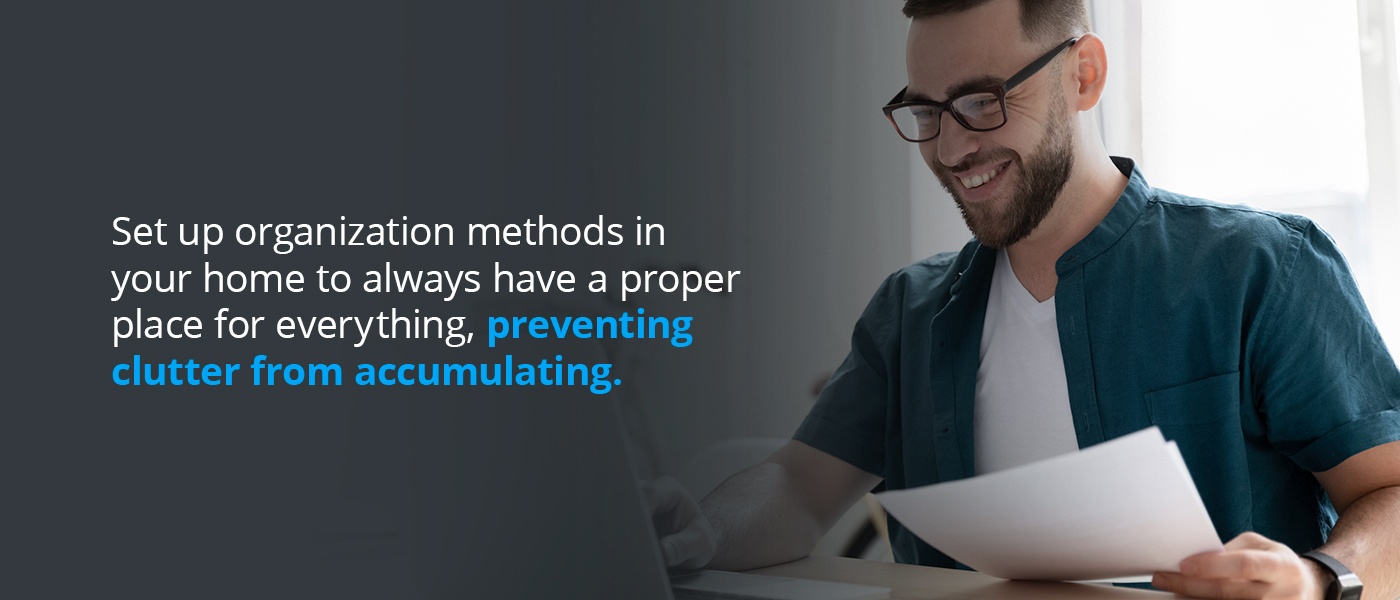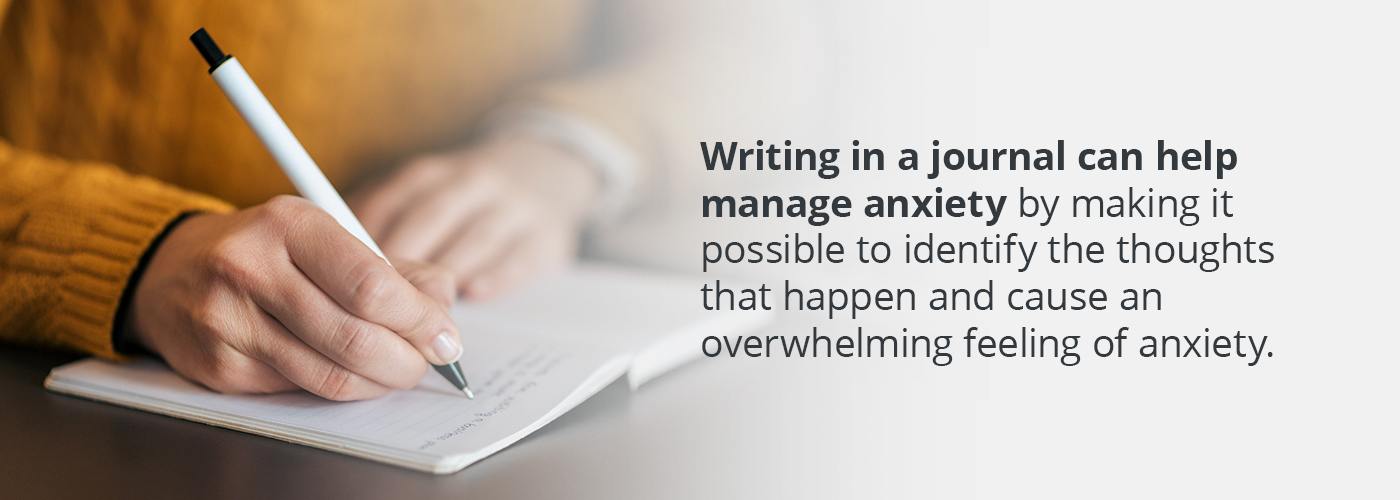Anyone who experiences anxiety, especially regularly, can benefit from knowing ways to manage their condition. While therapy and medication can help, you can also make lifestyle changes to help reduce anxiety daily. Here are a few ways you can change your habits to reduce anxiety.
Why Are Routines Helpful for Anxiety?
When working to control anxiety in your life, you first need to look at your schedule. Do you have a routine? Routines are vital to your mental health because they make self-care tasks such as showering, eating well, exercising and brushing your teeth automatic. Plus, having a routine can make it easier to handle unexpected stressors.
7 Habits to Cope With Anxiety
Use these tips as habits to help manage anxiety by adding them to your routine as needed. You don’t have to incorporate all these ideas into your life. However, the more habits you have to help your mind fight anxious thoughts, the more prepared you will be when they occur.
1. Eat a Balanced Diet
Foods help anxiety by providing your body with fuel to do what you love. If you don’t know what a healthy diet for your body and life looks like, talk to a dietician for customized advice. Otherwise, eat a generally healthy diet with plenty of fruits, vegetables, whole foods and water to remain hydrated and get enough vitamins and minerals. If you drink caffeinated beverages, you may want to cut back slowly until you eventually eliminate caffeine from your diet. Many studies have connected long-term caffeine intake with anxiety.
2. Reduce Clutter Around Your Home or Office
Seeing a cluttered, messy workspace or home can feel stressful to some people. The extra objects lying around bombard the senses with stimuli from the sight, smell and feel of the mess. Messy spaces also distract you from what you need to work on. Clutter can contribute to anxiety by creating frustration at having a messy space that feels impossible to clean or that you can never find anything. If you feel anxious more in certain spaces, see if cleaning up the area helps. You don’t have to spend an hour deep cleaning, either. Ask for help to clean the space. Set up organization methods in your home to always have a proper place for everything, preventing clutter from accumulating.
3. Exercise Daily
Regular movement can help you feel better by encouraging better breathing and sleep and releasing endorphins, your body’s natural feel-good hormones. Along with the physical changes you experience from exercise, you may also build friendships in group activities like running clubs or team sports. Exercise can also help you feel accomplished and improve self-esteem.
4. Establish Good Sleeping Habits
When you feel tired, you may not be able to keep up with your exercise or healthy diet. You may also rely more on caffeinated beverages to combat the fatigue. Neglecting your health can make your anxiety worse. Plus, a study from UC Berkeley showed that not getting enough sleep has a connection to triggering sections of the brain that cause you to feel anxious about anticipating something. To help manage anxiety, look at how well and how much you sleep.
5. Actively Oppose Negative Thoughts
When you have negative thoughts, such as, “I can’t do this,” or “I’m always anxious,” actively combat them. Use conscious thoughts to oppose the negative ideas. For instance, when you feel that you cannot do something, change the mental wording to sound more empowering. For example, you can say, “I will try my best to do this.” If you feel like your anxiety rules your life, remind yourself, “I am anxious sometimes, but I am working on coping methods to handle it.” By reframing your mind to put you in an empowered position, you can fight the negative thoughts when they happen.
6. Recognize That Your Feelings Do Not Always Reflect Reality
When you feel anxious, it can be difficult to stop the torrent of thoughts that stem from the emotions. However, if you want to know how to help anxiety, you need to understand that your feelings are only temporary emotions. In fact, anxiety-based emotions and the thoughts that come with them usually do not accurately reflect reality. For example, if you feel that you are a failure, your brain is filtering out the times when you succeeded to create the inaccurate thought. If you have thoughts connected to anxious feelings, think of evidence to counter them. When you think that you can never get ahead, think about the time that you got a promotion or learned a new skill.
7. Write Down Your Thoughts
Writing in a journal can help manage anxiety by making it possible to identify the thoughts that happen and cause an overwhelming feeling of anxiety. By learning the ways anxiety can twist thoughts and take them to extreme levels, you can begin to combat the thoughts effectively. Writing down thoughts is an important task because the process requires you to slow down and think more deeply about the thoughts you have and how your mind arrived at those conclusions. When writing out your thoughts, keep track of the following in your journal:
- What is happening?
- What are you thinking or telling yourself?
- What level of anxiety do you feel on a scale of 1 to 10?
How to Make These Habits Last
When establishing a routine, start small. If you miss a day of doing a new habit, forgive yourself. Setting up a new routine does not require perfection, only effort. For example, if you forget to write in your journal one day, do it the next day. If you make a mistake, pick yourself back up and continue on. Other ways to make your routine for anxiety control easier to incorporate into your schedule include the following tips for anxiety routine creation and maintenance:
- Replace one existing habit with a better alternative, such as taking a walk instead of an afternoon coffee for a pick-me-up.
- Start small by adding or changing one habit at a time so you don’t feel overwhelmed.
- Take time for things you enjoy.
- Give yourself rewards for reaching milestones.
- Customize your routine to your needs and lifestyle.
- Recruit a partner to help you stick to your new routine.
- Write down your accomplishments and new routines to keep a record you can look back on when you forget the hard work you’ve already done.
Talk to a Professional Counselor About Anxiety
Using these tips for how to manage anxiety can help in some cases, but if you still find yourself struggling, you are not alone. With a professional counselor, you can learn coping techniques, ways to combat negative thoughts or other ways to specifically help your anxiety. Connect with us at Merrimack Valley Psychological Associates to talk to a professional counselor about reducing anxiety and developing healthy habits in your life today.
Reviewed By
Dr. David Rainen, PsyD.
I am a licensed clinical psychologist with an extensive background treating a variety of different ages, situations, emotional and mental health disorders in individuals and their families. As part of my 10 year professional and training career in psychology, I have developed and refined my skills and approaches through my work in a variety of diverse settings including: hospitals, community outpatient facilities, college counseling centers, secure and unsecure inpatient/residential treatment programs, and therapeutic day schools.




